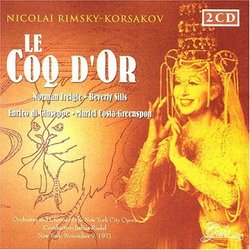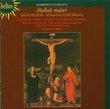| All Artists: Nikolai Rimsky-Korsakov, Julius Rudel, Samuel Samosud, All-Union Radio Symphony Orchestra, New York City Opera Orchestra, Beverly Sills, david rae smith, Edward Pierson, Enrico di Giuseppe, Gary Glaze, Ivan Kozlovsky, Mark Reizen, Muriel Costa-Greenspon, Norman Treigle, Syble Young Title: Rimsky-Korsakov: Le Coq D'Or Members Wishing: 1 Total Copies: 0 Label: Gala Release Date: 6/29/2004 Album Type: Import Genre: Classical Style: Opera & Classical Vocal Number of Discs: 2 SwapaCD Credits: 2 UPCs: 675754741624, 8712177045150, 675754741624 |
Search - Nikolai Rimsky-Korsakov, Julius Rudel, Samuel Samosud :: Rimsky-Korsakov: Le Coq D'Or
 | Nikolai Rimsky-Korsakov, Julius Rudel, Samuel Samosud Rimsky-Korsakov: Le Coq D'Or Genre: Classical |
Larger Image |
CD DetailsSimilar CDs
|
CD ReviewsSills radient despite the recording quality John Clement | 03/09/2005 (3 out of 5 stars) "I saw the production in question the year it opened at the NYC opera, and the recording is a faithful reproduction of Sills' and Tregle's marvellous performances. Even her laughter immediately tells you how she thinks the king is stupid, while making the king think she is girlish. The performance earns the highest rating. When hearing Tregle's performance as King Dodon one can understand why it was banned. He makes the king appear ineffective, overbearing, and not very bright. The brilliant libretto which parodies Czar Nicholas II is very effective in Tregle's voice. However, the quality of transfer is not very good. The original was the audio simulcast which was probably recorded on a home stereo tape recorder. Then it was subsequently made into a vinyl recording. The vinyl ticks an pops were still evident in the result. The last track on the first CD had some very large pops and a number of crackles. In addition there were some obvious tape dropouts. The ticks and pops are all removable by good quality software. Most of the dropouts are also easily spliced out as they are of very short duration, and the change is not audible. However there are several places where the volume suddenly jumps, possibly because of a skip in the recording process. This typically happens when using a computer for the recording, but it could be due to bad editing before the record was made. There is also the possibility that this is where the record breaks were located and GALA did not properly match the volume changes across the break. Finally there is a fairly large phase shift between the left and right channels which moves the orchestra to one side of the sound stage, despite having equal volume on both channels. When this is removed the orchestra and soloists are much more natural sounding and spread out better. I have a copy of the Sept 11, 1967 recording which although in mono was easily cleaned with nearly inaudible transitions between the record breaks. This earlier performance is nearly identical to the GALA recording, but with Nicol Castel as the Magician. The earlier performance may still be available from some vinyl dealers. So while I give the performance the highest marks, the transfer rates the lowest marks. The average would be three stars. However, the computer literate opera fan can use my hints to improve the recording, to bring it up to five. Even with the flaws it is a bargain and still the best stereo recording of Le Coq D'Or. Now I wish that the original telecast complete with the simulcast stereo track could be professionally released on DVD. Sills also acted with her body, and the combination of vocal plus visual would be a great pleasure to experience again. Since writing this review a B&W DVD of this performance has materialized. The DVD has bad herringbone interference, which can be partially removed by good software. When comparing the video with the audio recording it is evident that a few bars of music are missing, probably at record breaks. Apparently the original broadcast was marred by a color shift to green. But with professional software it might be possible to bring back the color, assuming master tapes exist. The simulcast could then be put back together with both video and stereo sound. It is possible that the herringbone pattern might be an improperly decoded color signal. Is there a company such as VAI interested in producing this as a tribute to Bubbles?" Still waiting for a Kirov Opera recording of Golden Cockerel C. G. Koonce | Columbia, MD USA | 01/29/2006 (3 out of 5 stars) "A previous reviewer is right about the "Mozart and Salieri" bonus being the best part of this set. The 1951 Soviet recording is amazingly superior in sound quality to the 1971 NYCO Cockerel. I'd love to hear Reizen's Dodon and Kozlovsky's Astrologer. Before a famous Italian tenor (Corelli?) visited Russia, Russian tenors had their own distinct style, a little reedier and lighter, in comparison to most Italian and other western tenors. Kozlovsky was among the best of the Russian tenor school, if not the best. (Fortunately, the old style is coming back into vogue among the new generation of Russian tenors.) I only broke down and bought the NYCO recording, because the Kirov has yet to record "The Golden Cockerel" in its series of Russian operas for Philips. The NYCO recording sounds like a tape or a vinyl record in sound quality, and the violins sound tinny in parts, but the playing itself under Julius Rudel is fine. The English-language production fills a gap but makes me wish more for a recording by a Russian cast." SERIOUS MATTER DAVID BRYSON | Glossop Derbyshire England | 12/21/2008 (4 out of 5 stars) "This 1971 live performance of Rimsky's Coq d'Or has received some fairly strong adverse comment on grounds of the recorded sound-quality. To some extent I have to go along with this criticism. The sound, particularly of the orchestra, is lacking in the charm and magic that any Rimsky score should radiate. `Dry' is not quite the right word, but the effect is oddly colourless, and that in a score remarkable for orchestral coloration even by the standards of one of the finest of all orchestral technicians has to be counted a serious drawback.
You could talk me out of my 4-star rating without much difficulty, but I'll stick with it for the time being because for one thing the unfavourable impression that the recorded sound creates is worst at the first hearing and not quite so bad subsequently; for another thing this performance has some particularly fine points in its favour; and for yet another there is the aptly entitled `bonus' of the rarely heard Mozart and Salieri. Julius Rudel's understanding of the main score seems just fine to me, and I expect that the orchestral players sounded much more winning in real life than the recording technicians allow them to sound for us now. One criticism that could not stand up would be in respect of clarity - the singers' enunciation is exemplary, and by a second hearing you will probably find that you can hear the English performing text in all the full and complete glory of its rhyming doggerel. Comprehension of the text is particularly important, and important for Mozart and Salieri as well as for the Coq d'Or. These are not nonsense-plots such as you might encounter in some 18th century operas. The Coq d'Or book is very obviously satire, it is not surprising that the censors spotted the parallels with Tsarist rule and the conduct of the Russo-Japanese war, and the tongue-in-cheek closing disclaimer by the Astrologer is ironic enough to be downright insolent, just rubbing the criticism in. It is all a serious matter, as Dodon declares in his first number, rhyming with `idle chatter' as its opposite. The text of Mozart and Salieri is pretty serious too, and I'd say you need to become aware of what it means in detail - this is easy enough on the internet. In these post-Amadeus days we are used to the story of the rivalry and Salieri's jealousy, but even that version absolves Salieri of poisoning Mozart, an accusation explicitly made in this short opera. This time it is sung in Russian. The voices are too close to the microphone, but the sound is not at all bad for 1951, and it would have been quite acceptable for Abbey Road let alone Stalin's Soviet Union. Beverly Sills as the Queen obviously made a strong impression by her acting. Just in sound I was not 100% convinced that her pitch was always spot on, but more significantly she has the vocal range and the high notes necessary in her big solo in the second act, a piece surely inspired by the coloratura aria for the Queen of the Night in the Magic Flute. The liner essay rightly praises Norman Treigle who sings Dodon, but for me the star among stars is Enrico di Giuseppe for his assured handling of the monstrous demands placed on whoever has to sing the Astrologer. In fact I do not fault any of the singing in either opera in any material respect. The vocal tone of Ivan Kozlovsky as Mozart is not greatly to my own liking, but it might well be thought appropriate to the kind of person that Salieri perceived and resented so bitterly. I hope that the foregoing may have made some sense of the 4-star rating, which I fully expect will be seen as perversely generous by some. As you will have gathered, libretti are not provided, but as you should also have gathered it is the work of only minutes to obtain on-line enough knowledge and comprehension of the texts. The liner note is informative and I thought it rather interesting, containing material on the performers as well as on the composer and his two works here. I would not claim to be entirely satisfied with what I have just acquired, but it will do to be going on with, until the urge to obtain a more expensive version of the wonderful Coq d'Or becomes ungovernable." |


![Maurice Duruflé: Complete Organ Works [Hybrid SACD]](https://nationalbookswap.com/cd//m/81/8281/6118281.jpg)
